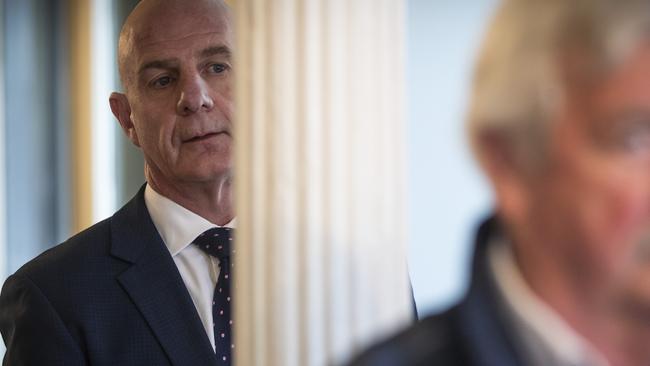Going for broke with locked down borders is a tricky line to hold
Yes, lockdowns are bad for the economy, but they do reduce the infection and death rates – so what are we supposed to do – is the cure worse than the disease, asks Charles Wooley.
Tasmania
Don't miss out on the headlines from Tasmania. Followed categories will be added to My News.
Conflicting opinions on whether to lock down or open up have me bemused.
The world infection rate for what Donald Trump calls the “China Virus” reached 30,000,000 this week and the death rate nudged 1,000,000.
A million deaths in a global population of almost 8,000,000,000 is, of course, regrettable but for some economists the percentage risk might support Trump’s foolhardy appraisal that “almost nobody gets it”.
The US has recorded about 7,000,000 cases and more than 200,000 deaths out of a population of 328,000,000. It’s not nobody, but it’s by no means everybody.
The global figures are officially drawn together by WHO and other international agencies, though given the spread in so many nations with poor health monitoring, you might assume the real numbers are much higher.
Then there are those better resourced totalitarian regimes. Their interest is always to keep the awful truth from their own people. And to keep the rest of the world in the dark.
In countries whose counting we can trust, among them Belgium, The Netherlands, Spain, Israel and the US, infection rates were grim this week.
Europe generally recorded higher numbers than half a year ago at the previous peak of the pandemic.
Typically, countries relax restrictions then suffer a resurgence. After “a summer of fun”, the UK is now recording 4000 new cases every day, forcing Prime Minister Boris Johnson to invoke another lockdown.
Yes, lockdowns are bad for the economy … but they do seem to reduce the infection and death rates.
After the March 23 closures in Britain, the daily COVID death rate fell from 1000 a day to 200 a day.
This week in Britain, at 4000 cases a day, the pandemic is out of control again and Johnson (who knows the plague only too well, having almost died of it) is threatening to get tougher.
“If people don’t follow the rules we have set out, then we must reserve the right to go further,” he announced.
Tory Prime Minister Johnson is a good friend of capitalism and private enterprise.
And just like our own conservative Premier, Peter Gutwein, he is under pressure from his party’s supporters in the business community to balance the loss of life against the destruction of the economy.

In the UK, some business interests seem to be arguing for a grim kind of social Darwinism in which we rank the survival of the fittest (and of the economy) above the survival of more vulnerable members of society.
In Tasmania, no one puts it quite like that. But Gutwein’s hard line on protection is constantly under pressure as the Tasmanian Chamber of Industry and the Tourism Industry Council of Tasmania conduct an unremitting campaign to reopen our borders earlier than the Premier has been intending.
They have every right to do so. Vigorous dissent and discourse is essential in a democracy. Spokesmen for these organisations (at least they have kept their jobs) warn that prolonging self-isolation will lead to economic self-destruction and point to “a very bleak 12 months ahead”.
Well, you can hardly argue with the bleeding obvious.
Just as chemotherapy is a painful medicine, so too is border restriction and social lockdown. And it is fair enough that some business owners repeatedly ask whether the cure is worse than the disease and might even kill the patient.
Yet in a time when self-interest and public interest might not be the same thing, it is also fair to ask of the opinion influencers the oldest question in journalism: “Who is paying you to say this?”
The ancient Latin phrase “Cui bono”, or “Who benefits?”, was applied in ancient Roman public debate and in the courts.
It was most brilliantly employed by Cicero to question whether it was society as a whole or influential individuals who benefited.
In this time of public crisis, there are too many conflicting opinions. Some are transparently self-interested. Others have seemingly credible arguments, attempting to separate reasonable risk from hypochondria and paranoia.
Even more difficult for journalists is this question. When experts disagree, who do you believe?
While things worsen abroad, here in Tasmania we have been so lucky to avoid what is happening in the world. But that doesn’t mean we are somehow immune nor that we have a health system capable of handling the challenge of a major outbreak.
In England, Johnson has closed the pubs from 10pm. This is pretty serious stuff in a country that loves its local just as much as we do.
There is now a “rule of six” limiting the size of social gatherings and office workers are again being urged to work from home.
Government medical experts are warning that things have “taken a turn for the worse” and fear the country could have 50,000 new cases a day by October.
In Britain as here, the government sensibly takes the advice of medical experts.
It is hard to see any reasonable alternative.
Until a vaccine arrives, it is also reasonable to vigorously debate, to argue and to disagree. And to listen to other opinions.
As long as you always ask “Cui bono”.
We don’t want to end up like a pod of pilot whales, poorly lead and blindly following into treacherous waters.



